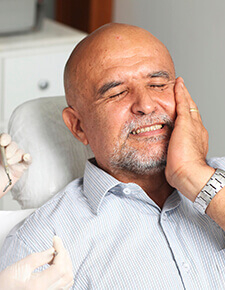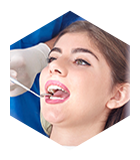Emergency Dentistry — Friendswood, TX
Relieving Pain & Renewing Smiles
 Note: Always call our Friendswood dental office (281 482 2631) to contact Dr. Sierra for emergency dentistry in Friendswood, TX if you have any concern that needs to be addressed immediately.
Note: Always call our Friendswood dental office (281 482 2631) to contact Dr. Sierra for emergency dentistry in Friendswood, TX if you have any concern that needs to be addressed immediately.
Types of Dental Emergencies
- Lost fillings, crowns, & bridges. This is usually a minor problem that rarely causes more than slight sensitivity, and can most often wait until regular dental office hours. Lost crowns and bridges can often be temporarily replaced over their original tooth. If you are going to be unable to have a dental office visit for a few days, try placing a small amount of denture adhesive (Fixodent) in the crown to hold it in place.
- Lost or loose provisional/temporary crowns and bridges. Again, usually a minor problem. Generally no harm will be done to the prepared tooth which may however, be very sensitive. We do prefer that the provisional crown be recemented to preserve the special relationships with the surrounding teeth.
- Toothache. A persistent toothache is generally a sign of a serious problem with a tooth, and may just be developing. A good test is how the discomfort responds to over the counter pain medication. If after plain Tylenol, Aleve, or Advil is taken, the tooth feels better, then the problem should hold until regular dental office hours. More persistent pain may mean an infection or a problem that needs immediate attention. You should never place any medication in the tooth or on the gums yourself, especially aspirin.
- Gum infections. Generalized gum bleeding and soreness can generally wait until a regular dental office visit can be scheduled. A sudden soreness and bleeding between teeth is often caused by food impaction. Try flossing and vigorous rinsing. If food is dislodged the area should feel better fast, but it should be checked in our dental office as soon as convenient. More serious swelling or a “gum boil” is often the sign of a more involved infection that will require antibiotics and attention.
-
Facial trauma. This topic covers a broad range that can be broken down as follows:
- Major head injury. Any major or serious blow to the head or face should be treated immediately and usually in a hospital emergency room. Often, immediate concern for concussions and other brain trauma outweighs even serious dental injury.
- Lacerations of the lips and gums. The mouth tissues are very fragile and tear easily, requiring sutures. Unsutured cuts and tears often result in ugly scars and lumps. Lacerations usually warrant at least a phone call to our doctors.
- Avulsed (knocked out) teeth. If you are certain that a primary (baby) tooth is involved this is usually not a serious problem because often the tooth is already loose because of age. However, even when a complete baby tooth is knocked out at an early age, we do not attempt to reimplant them. Permanent teeth knocked out should be placed in milk or water immediately and go directly to our dental office or if you are out of the area, any dental office. Call our answering service after hours so that we can advise you no matter where you may be. Reimplantation enjoys a fairly high success rate if done quickly.
- Broken or chipped teeth. First, attempt to determine if the tooth is a permanent or primary (baby) tooth. Both situations are rarely serious unless the tooth is loose or the pulp is exposed. Baby teeth near the time of normal loss are frequently chipped and knocked loose. This is not usually something to be treated immediately unless the tooth is severely loose. Broken teeth will almost always be sensitive but will wait until regular dental office hours unless the pulp (nerve) is exposed. A visible area of bleeding coming from inside the tooth usually determines this. Pulp exposures usually need immediate attention.
Please note that this list does not begin to cover all the possible dental emergencies, just the most common. If you have a dental problem that needs attention, or is causing you concern, please contact our emergency dentist near League City or answering service by dialing (281) 482-2631.
Dental Emergency Frequently Asked Questions
Do you want to know more about dental emergencies? Our expert staff has answered some of the most common questions about emergency dentistry in the FAQ section below. From preventive tips to how to pack a special first aid kit for dental trauma, we cover it all! To learn even more about how we respond to dental emergencies at Friendswood Dental Group, please do not hesitate to contact our team!
How Can I Prevent Dental Emergencies?
While not all dental trauma and toothaches are preventable, there are steps you can take to reduce your chances of experiencing a dental emergency. For example:
- Wear a mouthguard when playing contact sports like football or basketball to protect your teeth.
- Avoid eating hard foods that can crack your teeth, such as hard candies, popcorn kernels, and ice cubes.
- Never use your teeth to tear open a bag of chips or other type of packaging. Grab the scissors instead!
- Visit a dentist every six months for a routine dental exam and professional cleaning.
Should I Go to the Emergency Room Instead a Dentist?
Local emergency room personnel may not have the right tools or specialized knowledge to effectively respond to dental trauma. For this reason, we recommend always contacting an emergency dentist in Friendswood first if you experience a sudden dental injury. If you decide to call our dental office, Dr. Sierra will carefully listen to your situation and advise whether you need urgent dental care or if you should head to the emergency room instead.
Can Pain Medication Help During a Dental Emergency?
In many cases, over-the-counter pain medication can help temporarily ease the pain or discomfort caused by a dental emergency. If you are bleeding from the mouth, you may want to opt for acetaminophen over aspirin or ibuprofen. The latter two types of painkillers thin the blood, which could lead to even more bleeding. Finally, it’s important to note that over-the-counter pain medication is NOT a replacement for professional dental care. If you have experienced a dental injury or accident, do not wait to contact our dental office as soon as possible.
What Is a Dental Emergency First Aid Kit?
Dental emergencies often happen when you least expect them. That is why we recommend preparing a small first aid kit to help respond to dental trouble when you’re on the go. You can keep your dental emergency first aid kit in the car, at your work station or even in your purse or briefcase. Here is a quick list of what you should put inside:
- Small container with a secure lid (to hold a dislodged tooth)
- Small bottle of pain medication
- Gauze
- Cotton balls
- Dental adhesive
- Piece of paper with the contact information for an emergency dentist in Friendswood
Is Treatment Worse than the Problem?
If you struggle with dental anxiety, you may avoid seeking urgent dental care even if you are in a great deal of pain. However, failing to seek professional care during a dental emergency could lead to even more serious problems down the line. At Friendswood Dental Group, we are committed to making sure every patient feels comfortable during each and every visit, even in cases of an emergency. That is why we offer two types of sedation dentistry, nitrous oxide and oral conscious sedation. Rest assured you can get the urgent dental care you need without added stress and anxiety at Friendswood Dental Group.

 Checkups
Checkups Dental
Dental 3-on-6™
3-on-6™ Cerec® Same-Day
Cerec® Same-Day Full Mouth
Full Mouth Invisalign®
Invisalign® Cosmetic
Cosmetic Sedation
Sedation